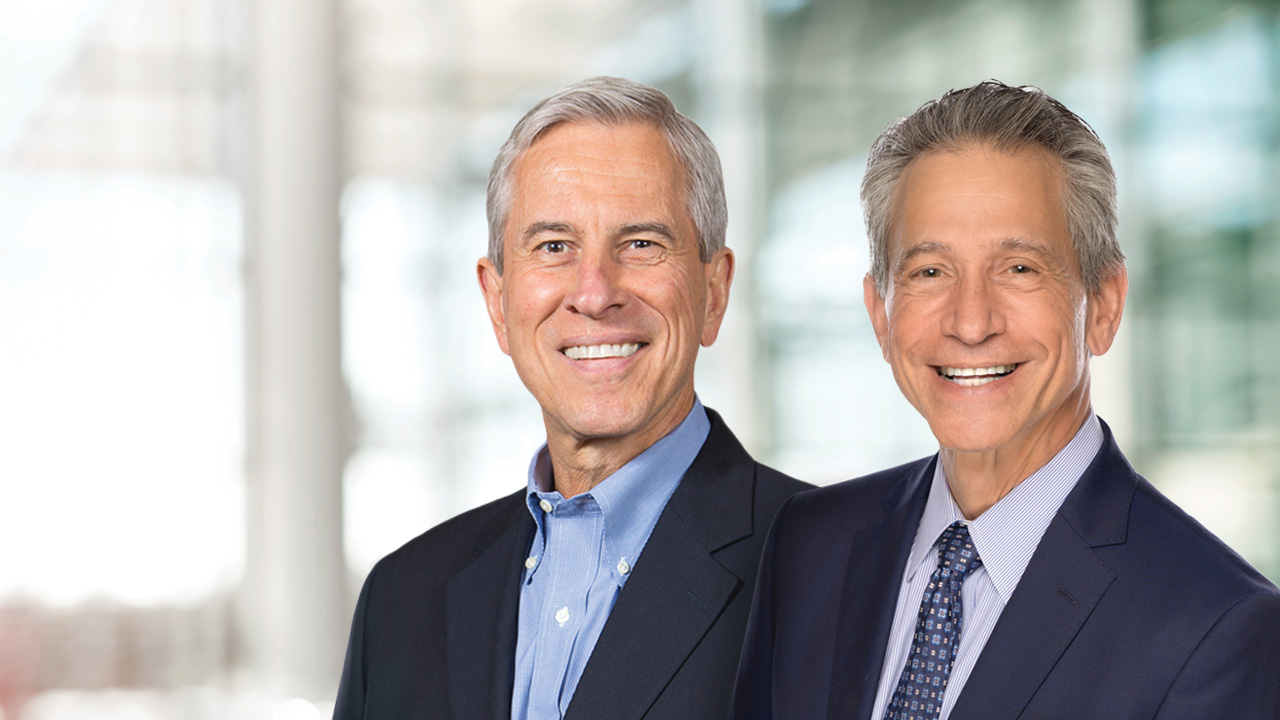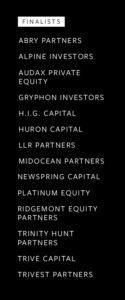Private Equity Firm of the Year: The Riverside Company
The Riverside Company was named Private Equity Firm of the Year in part for its 2022 deal activity, as well as for its role in the broader M&A ecosystem.

The Riverside Company has come a long way from its start in 1988, when Founder and Co-CEO Béla Szigethy launched the firm in his Riverside Drive apartment in New York as an independent sponsor without much capital. By 2004, Riverside had grown its assets under management to $1 billion and now boasts as much as $14 billion in assets under management and 16 offices across the U.S., Europe and Asia-Pacific.
Despite the blockbuster growth, the firm has remained focused on what it calls “the smaller end of the middle market,” where Riverside executives can find unique investment opportunities for limited partners. As the firm continued to grow its offices, staff and strategies, people who have worked with executives there say Riverside personnel have remained accessible and communicative.
This section of the report originally appeared in the special edition Middle Market Growth: the 2023 MAX Awards issue.
Pictured above: Riverside Co-CEOs Béla Szigethy and Stewart Kohl.
The firm’s approach has worked well for Riverside. Its fund performance has been commendable at a time when public stocks and other investments were down, according to Stewart Kohl, co-CEO at Riverside. “The companies you own have to grow and succeed regardless of macroeconomic conditions,” Kohl says.
Delivering in Hard Times

Despite a variety of market headwinds in 2022, Riverside made about 32 platform investments and 87 add-on acquisitions. The firm’s control equity/buyout strategy houses roughly 77 companies, which grew their sales by 14% and EBITDA by 11% compared with calendar year 2021, Kohl says.
Delivering returns to investors and continuing to put money to work despite macro challenges hinge on “being a better buyer and a better owner,” Kohl says. To become a better buyer, Riverside has developed specializations based on deep sector expertise and then developed investment theses.
For example, Riverside has a lot of confidence in what it calls the SSCRM (safety, security, compliance and risk mitigation) thesis. The firm has made almost 50 platform investments in the sector with many more add-ons, and Kohl thinks these services at schools, religious institutions, offices and other establishments will grow.
A page on the firm’s website says that “SSCRM companies have growth potential because they help customers avoid or minimize bad outcomes. In an increasingly complex world with a variety of threats to health and security, companies that mitigate or eliminate risk are generally well-positioned to succeed.”
“We’re active investors in that thesis, and the companies in that bucket have outperformed the portfolio as a whole,” says Kohl.
Some of Riverside’s 2022 acquisitions across sectors include ProVelocity, a Colorado-based IT service provider that helps businesses and government agencies manage their technology needs; Montel, a Norwegian provider of energy and power market information; Siffron, an Illinois-based designer and manufacturer of merchandise display and loss-prevention fixtures in stores; and ESHA Research, an Oregon-based provider of nutrition analysis and regulatory compliant labeling software and services.
Eliot Peters, a principal in investment banking at RA Capital in San Diego, advised ESHA in its sale to Riverside. He says Riverside is communicative and direct in its approach to screening deals. “They’re very deliberate in the way they operate. If they don’t like an opportunity, they’ll give us a fast thumbs-down and don’t waste our time. If they like something, they lean in and are very proactive,” he says. Peters had brought about a dozen other opportunities before Riverside over the years.
The ESHA auction was a competitive process that had two finalists at the end, Peters says. Riverside was selected based on the best price and terms and how engaged they were with the company. “They listened to the management team and highlighted aspects of their organization where they could be helpful to the business,” Peters says. “All eight of the senior team members unanimously thought Riverside was the best buyer.”
Pam Nightingale, managing director, financial sponsors at investment bank Piper Sandler, says Riverside has a strong origination approach that makes the firm stand out in the industry. “They have a team-oriented, thoughtful and disciplined sourcing process that was one of the first of its kind and now extends across all of the firm’s investment strategies,” she says. Nightingale has worked with Riverside for close to 15 years, and Piper Sandler has sold Riverside a number of businesses, including Harvey Performance Company, a provider of cutting tools for precision machining, and SureWerx, a supplier of professional safety products, tools and equipment.
Operator Expansion
They have a team-oriented, thoughtful and disciplined sourcing process that was one of the first of its kind and now extends across all of the firm’s investment strategies.
Pam Nightingale
Piper Sandler
For the companies Riverside owns, being better owners means having hands-on operating partners engaged with the portfolio companies on a continued basis, Kohl says. Since hiring the firm’s first operating partner in 1997, Riverside has grown the team to 70. The operating partners usually chair or sit on the board of portfolio companies and help them grow. “If something goes wrong, they’re quick about letting us know and fixing it,” Kohl says. The firm’s operating partners are often attached to fund families and assigned based on industry or functional expertise, depending on their background.
In the 35 years since Riverside’s inception, the firm has bucked the trend of moving up market as it’s gotten larger. Kohl says the companies it invests in tend to range from $10 million to $400 million in enterprise value. Some deals in recent years have gotten larger within this range as multiples have crept up. But as measured by the EBITDA at acquisition, platform size has remained stable. According to Riverside’s website, its buyout Capital Appreciation strategy usually targets platform investments with $10 million to $35 million in EBITDA. The firm’s Micro-Cap strategy, designed for smaller deals, focuses on businesses with $10 million in EBITDA or less.
“We believe that small is beautiful and invest where there is potential to grow and create value,” Kohl says. “We bring unique resources to achieve this outcome.”
Broadening the Scope
Although Riverside has remained focused on the smaller end of the middle market, the firm has expanded its capabilities in other ways. In addition to its traditional private equity buyout strategy, Riverside has also added flexible capital and private credit arms. The flexible capital division makes non-control investments in a variety of companies, while the flexible capital arm offers debt capital to sponsored and non-sponsored companies.
In addition to adding the Micro-Cap strategy to target lower middle-market businesses, Riverside launched other efforts aiming at European investments and companies with 30 million euros or less in EBITDA. Its Australia and New Zealand team targets companies in those countries with EBITDA of $3 million to $20 million over the prior 12 months. The firm also has a Riverside Technology Capital Solutions division, which invests exclusively in technology companies, and Riverside Value, which targets special situations investments in businesses with unique challenges. These companies usually have $75 million or more in revenue.
The expansion globally and across strategies has helped Riverside be flexible and engaged when traditional platform buyout opportunities are not as plentiful, says Jonathan Zucker, head of capital advisory at Intrepid Investment Bankers in Los Angeles. Zucker has worked with Riverside on a variety of deals. “We’ve sold them businesses and helped them sell businesses. They’re always highly involved in the process and responsive. Part of it, I think, is their Midwest roots—they give off a nice, good people kind of vibe.”
 Riverside has two headquarters: one in Cleveland, where Kohl is based, and the other in New York under Szigethy’s leadership. The Riverside Company launched
Riverside has two headquarters: one in Cleveland, where Kohl is based, and the other in New York under Szigethy’s leadership. The Riverside Company launched
a new value investing arm in 2019, after bringing on managing partner Sean Ozbolt from Aurora Resurgence, an Aurora Capital Partners arm focused on special situations in the middle market. In late 2021, Riverside launched its Riverside Value Fund I, targeting a $350 million fundraise and turnaround investments, according to Buyouts Insider and LP documents. The firm’s presence and expansion in Los Angeles stemmed in part from the build-out of the value investing team there.
“It’s a different strategy that addresses different investment opportunities and allows them to be flexible,” says Zucker, adding that special situations/distressed investing, minority/non-control options and private credit let the firm cast a wider net beyond just traditional buyouts.
Connecting the Dots
Zucker sits on the ACG Los Angeles board of directors, where he has come to know Jeremy Holland, a managing partner in origination at Riverside. Holland is part of the Private Equity Roundtable Committee within ACG LA, where fellow members say he is well respected. “He is very well networked, very responsive and exemplary on being thoughtful in different ways, not just finding deals,” Zucker says. Holland is often helpful in connecting people on other deals that might not be a fit for Riverside or helping people find jobs in the industry.
“For a large organization, they still feel small in terms of access and communication,” says RA Capital’s Peters. “Riverside executives will often tell bankers what they think as they are pitching deals and communicate generally on what they’re seeing and hearing in the market.
“Even as they’ve grown, we’ve never lost access to them; they keep their relationships,” he adds, noting that he’s still in regular contact with Holland, while other firms tend to pass contacts over to junior staffers as they grow.
Holland and other senior Riverside executives have been active in the ACG community for some time. All in all, Riverside had 23 staffers as ACG members in 2022, and Riverside employees attended 80 of the association’s events last year.
Bob Landis, founding partner in origination at Riverside, chairs the ACG New York chapter and is also this year’s recipient of the ACG Legend Award. Cheryl Strom, a partner in origination in Cleveland, is on the board of the ACG Cleveland chapter and served as its president in 2022.
“She helped the chapter navigate through the tumultuous period coming out of COVID,” says Corrie Menary, a partner at Kirtland Capital Partners and board member at ACG Cleveland. “They do a lot to encourage the M&A community and they’re not selfish. Their goal is to see deals get done, even if it’s not their deal.” Menary’s firm does smaller deals than Riverside, and she says Riverside has facilitated introductions and referrals on deals that fall outside their size parameters. “One of their pillars is: Leave good references in your wake,” she adds.
Riverside has been engaged in a number of ACG initiatives, including sponsoring the Great Lakes Capital Connection and other regional events. Strom and Pam Hendrickson, vice chairman and former COO at Riverside, have been instrumental in hosting events to help young women learn about and join the dealmaking industry.
Piper Sandler’s Nightingale says Riverside employs “a deep bench of talented women” and was one of the first in private equity to hire and retain women at all levels within the organization, contributing to the diversity of its staff.
Strom cites examples of Riverside’s efforts to promote inclusion in private equity, which she says include “hosting and funding career development dinners for junior and entry-level women and bringing on paid interns from the nonprofit 51 Vets, in order to help give military veterans on-the-job experience, so they may successfully transition to the financial services industry.”
Anastasia Donde is Middle Market Growth’s senior editor.
View additional MAX Awards recipients here.


